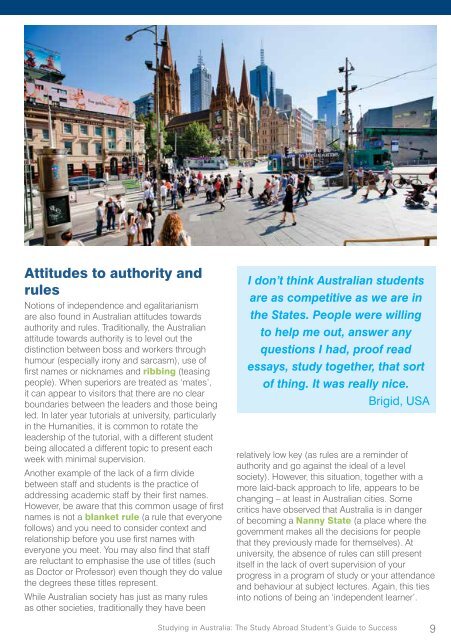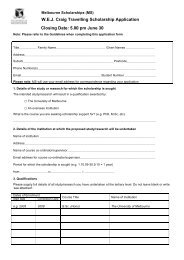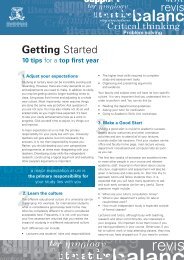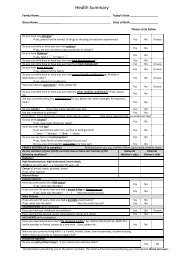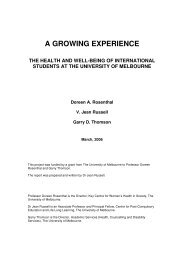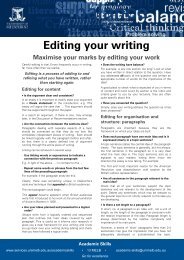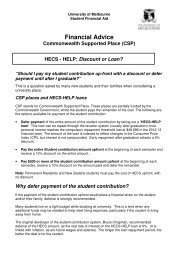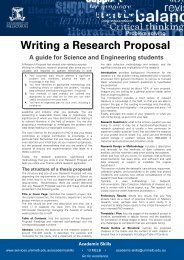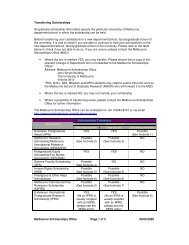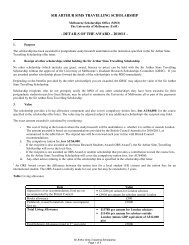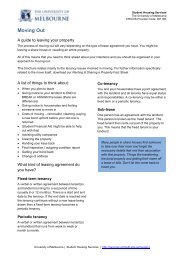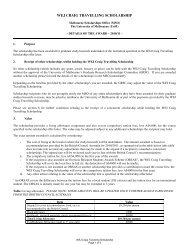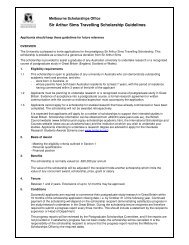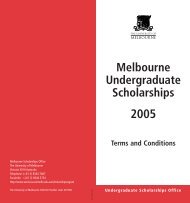Studying in Australia: The Study Abroad Student's Guide to Success
Studying in Australia: The Study Abroad Student's Guide to Success
Studying in Australia: The Study Abroad Student's Guide to Success
Create successful ePaper yourself
Turn your PDF publications into a flip-book with our unique Google optimized e-Paper software.
Attitudes <strong>to</strong> authority andrulesNotions of <strong>in</strong>dependence and egalitarianismare also found <strong>in</strong> <strong>Australia</strong>n attitudes <strong>to</strong>wardsauthority and rules. Traditionally, the <strong>Australia</strong>nattitude <strong>to</strong>wards authority is <strong>to</strong> level out thedist<strong>in</strong>ction between boss and workers throughhumour (especially irony and sarcasm), use offirst names or nicknames and ribb<strong>in</strong>g (teas<strong>in</strong>gpeople). When superiors are treated as ‘mates’,it can appear <strong>to</strong> visi<strong>to</strong>rs that there are no clearboundaries between the leaders and those be<strong>in</strong>gled. In later year tu<strong>to</strong>rials at university, particularly<strong>in</strong> the Humanities, it is common <strong>to</strong> rotate theleadership of the tu<strong>to</strong>rial, with a different studentbe<strong>in</strong>g allocated a different <strong>to</strong>pic <strong>to</strong> present eachweek with m<strong>in</strong>imal supervision.Another example of the lack of a firm dividebetween staff and students is the practice ofaddress<strong>in</strong>g academic staff by their first names.However, be aware that this common usage of firstnames is not a blanket rule (a rule that everyonefollows) and you need <strong>to</strong> consider context andrelationship before you use first names witheveryone you meet. You may also f<strong>in</strong>d that staffare reluctant <strong>to</strong> emphasise the use of titles (suchas Doc<strong>to</strong>r or Professor) even though they do valuethe degrees these titles represent.While <strong>Australia</strong>n society has just as many rulesas other societies, traditionally they have beenI don’t th<strong>in</strong>k <strong>Australia</strong>n studentsare as competitive as we are <strong>in</strong>the States. People were will<strong>in</strong>g<strong>to</strong> help me out, answer anyquestions I had, proof readessays, study <strong>to</strong>gether, that sor<strong>to</strong>f th<strong>in</strong>g. It was really nice.Brigid, USArelatively low key (as rules are a rem<strong>in</strong>der ofauthority and go aga<strong>in</strong>st the ideal of a levelsociety). However, this situation, <strong>to</strong>gether with amore laid-back approach <strong>to</strong> life, appears <strong>to</strong> bechang<strong>in</strong>g – at least <strong>in</strong> <strong>Australia</strong>n cities. Somecritics have observed that <strong>Australia</strong> is <strong>in</strong> dangerof becom<strong>in</strong>g a Nanny State (a place where thegovernment makes all the decisions for peoplethat they previously made for themselves). Atuniversity, the absence of rules can still presentitself <strong>in</strong> the lack of overt supervision of yourprogress <strong>in</strong> a program of study or your attendanceand behaviour at subject lectures. Aga<strong>in</strong>, this ties<strong>in</strong><strong>to</strong> notions of be<strong>in</strong>g an ‘<strong>in</strong>dependent learner’.<strong><strong>Study</strong><strong>in</strong>g</strong> <strong>in</strong> <strong>Australia</strong>: <strong>The</strong> <strong>Study</strong> <strong>Abroad</strong> Student’s <strong>Guide</strong> <strong>to</strong> <strong>Success</strong>9


